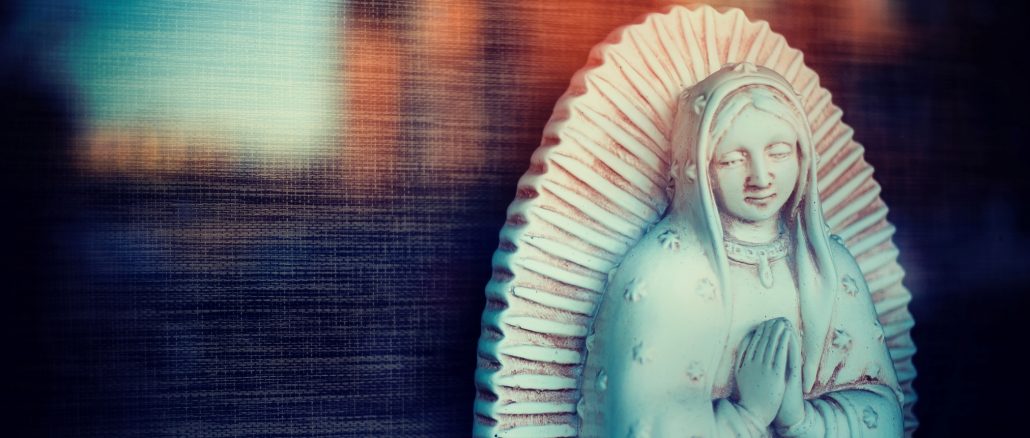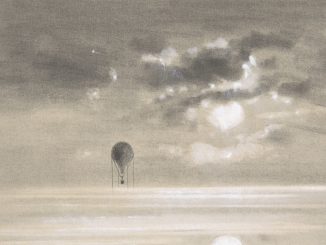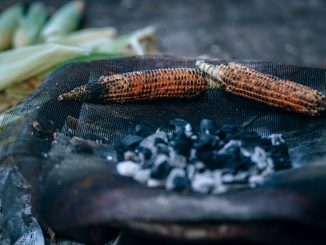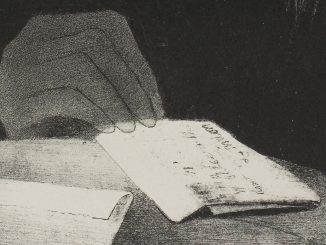
I stood in the receiving line, receiving. Handshakes, pats on my shoulder, half-hugs, breath in my ear. Receiving words meant to condole. “I’m so sorry for your loss. Your mother was such a wonderful woman. Let us know if there’s anything we can do.”
Condole. Worthless word. Another styrofoam peanut to pack around my fragile heart; a weightless bit of white nothing.
I felt my husband’s hand press against the small of my back. Here was comfort. Here was courage.
The funeral was touching. An assortment of granddaughters, including my children, stood bravely behind the podium and paid tribute to my mother’s greatest achievement: her seemingly effortless, endless ability to express love for them. The songs at the piano, the dresses and nightgowns fresh from the sewing machine, the hand-crafted cookies and pies, the laughter. The stories told in bed with them snuggled next to her under the covers while she sipped her first cup of coffee. The bawdy jokes; the naughty pranks.
The grandsons sat in silence, choosing to keep their grief to themselves.
By the time her pastor took the stage, he shook his head ruefully. “I feel like I knew an entirely different Jean: the faithful church member who played the organ every Sunday and volunteered whenever she was asked. I didn’t know this spirited, amusing woman her granddaughters describe with so much joy and affection.”
Bingo. A different Jean. Who she was depended on who you were, where you were. We all do this to some degree, but my mother slipped between roles with impressive thoroughness and ease. The inveterate chameleon.
I knew this about her. Of course I did. Which is why I didn’t need it so poignantly, painfully clarified on that day of all days—the day we buried her—by Katy, my best friend from childhood. But what’s a childhood best friend if not the one friend in the world who knows best how to cut right through to your childhood vulnerabilities?
***
I can’t remember if Katy found me or if I attached myself to Katy like a barnacle, but once we connected in seventh grade, we knit the tightest of best friend bonds. Katy’s thick cape of straight brown hair swung just above the impossibly tiny waist of her perfect hourglass figure. But the timing was wrong for her body: these were the Twiggy days. And I was a Twiggy. Bony shoulder blades, knobby knees, flat chest, boy hips. “I sure wish I was skinny like you,” Katy said. “I’d give anything to have your hair,” I replied.
The modest house she lived in sat on a street at the back edge of town. I remember aqua. A garish aqua kitchen: cabinets, appliances, countertops, walls, everything. The back yard fenced in a patch of weeds and fenced out fields of nothing. Katy’s bedroom opened directly off the tiny living room; her grandmother’s bedroom lived off the kitchen. That was it. But at least they had shelter; in today’s economy, they likely would have been homeless. Grandma washed dishes at the one “fine dining” restaurant and lounge in our tiny sawmill town. The neon sign proclaimed it the Blue Garden, but everyone referred to it as the Blue Garbage. She worked long hours bent over the sinks, came home exhausted, propped her hideously varicose-ridden legs up on a plastic-upholstered aqua kitchen chair and oozed obligation over Katy without saying a word.
Katy’s unwed mother dumped her off in Dallas, Oregon as a toddler and high-tailed it back to her secretarial job in the LA music industry. The only thing she ever sent back was an occasional first-run copy of an LP. I remember an album cover of Elton John before he looked gay. I don’t remember feeling sorry for Katy. The dissimilarity between my spacious rambling house and her cramped rooms, between my boisterous family of five and her quiet, constrained existence with Grandma simply didn’t register as something to feel bad about. Katy didn’t complain or make comparisons, never drew those differences to my attention. She bobbed along the stream of her life, a buoyant personality, seemingly untroubled by her circumstances.
We celebrated Friday nights with sleepovers, listened to rock on the radio, lit candles, wrote poetry under hip aliases. Our big life plan was to head to Switzerland and become shepherds on the Alpine slopes as soon as we graduated high school. But we ran into a roadblock.
Katy and I hit all the milestones together: First menstrual period. First kiss. First love.
We shared the moment that changed the course of our lives.
One fragrant, buzzing spring day in our sophomore year, Katy and I wandered to the city park clad in Levis and tie-dyed T-shirts. I moaned. “If there was just one cool guy in our stupid town, it wouldn’t be so pathetic and boring.”
“Make it two so I can have one,” Katy said.
Our adolescent dreams suddenly materialized in two long-haired, bearded, beaded boys lounging on a picnic table. We looked at each other in disbelief, checking to make sure it wasn’t a mirage of teenage imagination. These were not the garden variety hippies, however. I wonder what turn life might have taken if all they wanted was to smoke pot and get in our pants. These boys were after something much more insidious than sex and drugs: they were after god fodder. Part of the Jesus Freak movement that peaked in the ‘70s—think “Jesus Christ Superstar”—they were on the lookout for souls.
The young men lived in a Christian commune in Salem and hitchhiked to Dallas to proselytize. As they flipped to various verses in their tattered Bibles and talked to us about salvation, something deep down in me sighed with relief. I had a glimpse of letting go of the hard work it took to keep my repressed guilt repressed. They promised freedom, love, acceptance. The burden of self-loathing and anxiety I carried could be washed away under the blood of Jesus.
I didn’t stand a chance against the tailor-made brew of two parts Jesus mixed with one part Freak. Neither did Katy. We led the boys back to my house, where I proposed to house them for the night.
Mom took one look and took on her PMS screech: “We can’t have total strangers—especially boys!—sleeping in the house.”
Dad agreed with her, as usual. “As your father, I can’t allow something so reckless.”
All those childhood lessons in Sunday School at the First Christian Church finally came in handy. “But the Bible says if you show hospitality to strangers, you might entertain angels unaware. You don’t want to miss a chance to entertain angels, do you? They’ve got nowhere else to stay. Besides, if you put them in the living room, they’ll be a whole floor away from my room. Nothing bad is going to happen.”
I won.
Next I begged my parents to take me to the Bible studies at the commune, and soon my whole family became infected with Jesus Freak enthusiasm. Dad let his banker’s haircut grow over his ears and my fashion-conscious mother sewed long peasant dresses. We started our own weekly Bible studies, which grew so fast soon we were hosting up to sixty people three times a week. The responsibility overwhelmed my father. When Brother Dwayne—a recently dethroned elder from the local Assembly of God Church—insinuated himself into our family, Dad gratefully handed over the reins for all those souls. But Brother Dwayne had an agenda. He methodically dismantled our loose, Jesus-as-social-outcast-carpenter ideology and transformed it into classic fundamentalism: Men rule. Women submit. The world is evil. Education is suspect.
As a result of this inculcation, at the end of my senior year, my parents made an announcement.
“We don’t think you’re strong enough in the Lord to attend a secular school,” Dad said at the kitchen table. I assumed that meant running off to Switzerland was out of the question.
“Besides, we don’t have the money for tuition, anyway.” Mom could always be counted on to advocate for not spending money on me, regardless of what it was for.
They nudged and cajoled and cornered me into Brother Dwayne’s recommendation, which was Portland Bible College, a non-accredited school under the auspices of Bible Temple, a charismatic, fundamentalist church whose doctrine was too pure and unadulterated to be associated with any denomination. The school was also ridiculously cheap, which it should have been, as the degree was worthless. But the degree didn’t matter; the point was to find a spiritual man to marry so I could get on with my prescribed calling: helpmate and child bearer.
Katy followed me.
Katy’s easy-going nature conformed to the piety and submissiveness required for females at Bible Temple more naturally than mine. Or maybe she was just more religious. She took on demure, downcast eyes and mouthed the platitudes so prevalent in that culture. “Praise the Lord!” was the preferred response for everything from a healing miracle to a wadded-up dollar bill found in a pocket. I bristled at the blatant misogyny and absurd, old-fashioned rules. I also committed “sins” condemned from the pulpit: sneaking out to the movie theater, hiding a TV in my dorm room, hiding a boyfriend in my dorm room, piercing my unholy ears. Before the first term was over, Katy and I found new best friends more suited to our individual level of godliness, but we still maintained the structure of friendship. We performed roles at each other’s weddings, attended each other’s baby showers for our first children—born just a few months apart—and got together for play dates. Then an uncrossable chasm opened between us.
Katy and her husband had pastor ambitions in our religious world. My first husband and I became disillusioned with the narrow rules and narrower thinking after we spent over a year on a mission team. When we returned, we drifted away from Bible Temple. But Katy was still my oldest friend. Right?
“Hi Katy. Want to come over for lunch this week so the kids can play and we can catch up?”
A pause.
Her voice turned cold, clipped, mechanical. Which is to say righteous. “We plan to go into the ministry. We can’t associate with backsliders. When are you coming back to church?”
And that was it. Fifteen years of friendship batted away with the back of her hand.
She wasn’t the only one, but she was the one that cut the deepest.
***
Katy and I had long been estranged when Mom was diagnosed with stage IV colon cancer. Mom and I had also been estranged at times. I stubbornly refused to accommodate her religious and social mores and she stubbornly refused to love me unconditionally, but we declared one week of ceasefire every year. Each summer my mother and I took my daughters to the beach. She told hilarious stories from her youth and made pot roast. We ate Peanut M&M’s—the pound bag. We shared the same bed and talked into the night. It was our bonding ritual, and it was sacred.
I got the call in April from my strong-boned, stoic mother: “I’ve never felt this sick in my life. The doctor can’t figure out what’s wrong. I don’t know what to do.” I put my life in Portland on hold. Hospital tests, doctor visits, phone calls. The yellow legal pad balanced on my thigh, trying to scribble everything the doctor said. Asking the questions no one else in the room would.
“What’s her prognosis?”
“The truth? At best, six months. At worst, two weeks.”
She determined to have one more summer.
In the afternoon before her daily nap, we lay next to each other on her bed and admired the flowers and trees outside her window—purple wisteria trailing the eves, the unabashed blooms on her white dogwood, crowds of gladioli, fuchsia, hydrangea, roses—every single one of which she’d planted and carefully tended. As she waited for sleep to overtake her, we giggled and murmured and said private thoughts we’d never shared before, let go of the old resentments that now seemed as trifling as the petals drifting away on the breeze.
When the hospital bed arrived, we installed it in the family room. I whisked in from my other life—my real life?—and opened the shades, turned off the TV, turned on classical music, cleared the newspaper and magazine clutter.
“Hey, I was watching that. I wasn’t done reading that.” My father.
“Mom doesn’t want to hear sports on TV and look at this mess,” I said.
“How do you know what she wants?” he groused.
My mother shushed him and smiled. “She’s my daughter. She knows what I like.”
One Sunday afternoon I massaged lotion into her feet while my new husband played the piano for her in the living room. “I’m already in heaven,” she said. “You’re such a good daughter. You know just what to do to take care of me.”
The last time I saw Mom, the leaves were beginning to turn gold and orange in the still-warm air of September. She no longer had the strength to speak, but we communicated what was necessary. Perhaps the fact she was unable to say anything made it easier for both of us. I perched on the edge of the hospital bed and took her hands in mine. “I know you worry about me and the girls, but I promise you, we’re going to be all right.”
She squeezed my hands and nodded.
“And don’t feel bad about anything that’s happened. It’s okay. There’s nothing to forgive. I love you.” I leaned down and gently touched my lips to hers.
She blinked her tears away to let me know she understood.
We were good.
I drove home, my heart at rest.
Mom died the next night. I got up in the morning and gazed out my bedroom window at the green layers in the backyard: fir, yew, holly, bamboo. Mom’s presence was palpable. I felt her in the breeze that tickled the leaves into a gentle dance, in the first warming rays of sun penetrating the branches. Her spirit took up residence in my heart, a soothing presence with no rancor, no disapproval, no animosity. Somehow, in her dying, my mother filled the empty space that sought her love and acceptance my entire life.
We were good indeed.
Until Katy.
***
I shifted from one sore foot to another and craned my head to see how much longer this receiving line could possibly go on. I saw Katy and her husband snaking their way toward me. I stiffened my spine and my smile.
The familiar tilt of Katy’s head, the gushing sympathy in her voice. “Your mother was such a wonderful sister in the Lord. I hope this little gift brings you comfort.”
She pressed a book into my hands shrouded in flowered wrapping paper and moved on. I shoved it in my purse and focused on the grinding line. When I crawled into the passenger seat of our car at the end of the heartbreak day, exhausted and numb, I pulled the gift out of my bag and tossed it on the dash. I planned to ignore it, give it no weight, no meaning. Maybe throw it away unopened. But it began to glow in the sunset slanting through the windshield. The delicate blue and green flowers on the wrapping paper whispered open me open me open me.
“May as well get this over with now,” I said aloud, more to myself than to my husband. I peeled the wrapping off, turned the book over in my hands, read the title. A Christian daily devotional of some sort. “Of course,” I muttered under my breath. Then I opened the front cover to find an inscription from Katy.
“The last time I spoke to your mother before her death we prayed together. The only concern on her heart was whether or not she would ever see you in heaven. I hope this little book will help you find your way back to the Lord so her dying wish can be fulfilled.”
***
I never know how to proceed from here.
Do I describe the grip of fresh grief around my heart, how I burst into tears, threw the book on the floorboards, bent over in the seat, clutched my arms around my waist in an attempt to hold the pain inside my body and keep it from seeping out and filling up the car so neither of us could see or breathe?
Do I repeat the angry invectives I spewed between sobs because anger is so much easier for me than grief?
Do I reiterate my eventual thought process, trying to decide whether Katy is deliberately cruel and malicious or so thoroughly ignorant that she imagined she was being helpful or just religiously arrogant to such an astonishing degree that she lacks any aptitude for empathy? Did she really want to leave me with this memory of my mother as a parting gift?
Do I admit to the churning qualms that maybe Katy wasn’t exaggerating, that maybe my mother did say those words to her, even though she knew how I felt about Katy? Did my mother really think I was on my way to hell—as Katy obviously did—in spite of all our intimate conversations, our reconciliation, our heartfelt honesty? Or did Mom once again change the color of her skin to blend into the sanctimonious shade Katy brought into the room?
Do I solidify in black and white on the page the worst fear those words imploded in my heart, that maybe—just maybe—Mom’s last days with me were also another chameleonic turn? That her behavior was feigned, her words untrue?
I think instead I will describe what I did with that gift and its inscription.
One rare free weekday morning, alone in the house with grey fall skies muting the light through the living room window, still constricted with grief, I blared Patty Griffin from the stereo, lit a fire in the fireplace, sat on my knees in front of the hearth, and ripped that book apart with my bare hands into searing tearing chunks. I hurled defiance at Katy and her mean-spirited god as I hurled the pages into the flames and let my pain and anger burn and turn until it was cold ash.
And cold ash, Katy, is all I have left to give to you.
Author
 RENEE SOASEY is finishing a degree in Creative Writing at Portland State University and has nonfiction published in Oregon Humanities Magazine, Entropy, and The Gravity of the Thing. She hopes to finish an off-the-grid home in the middle of nowhere, Oregon, where she imagines she will finish her memoir.
RENEE SOASEY is finishing a degree in Creative Writing at Portland State University and has nonfiction published in Oregon Humanities Magazine, Entropy, and The Gravity of the Thing. She hopes to finish an off-the-grid home in the middle of nowhere, Oregon, where she imagines she will finish her memoir.
Twitter: @ReneeSoasey
Featured image: Photograph by Tim Mossholder on Unsplash.


